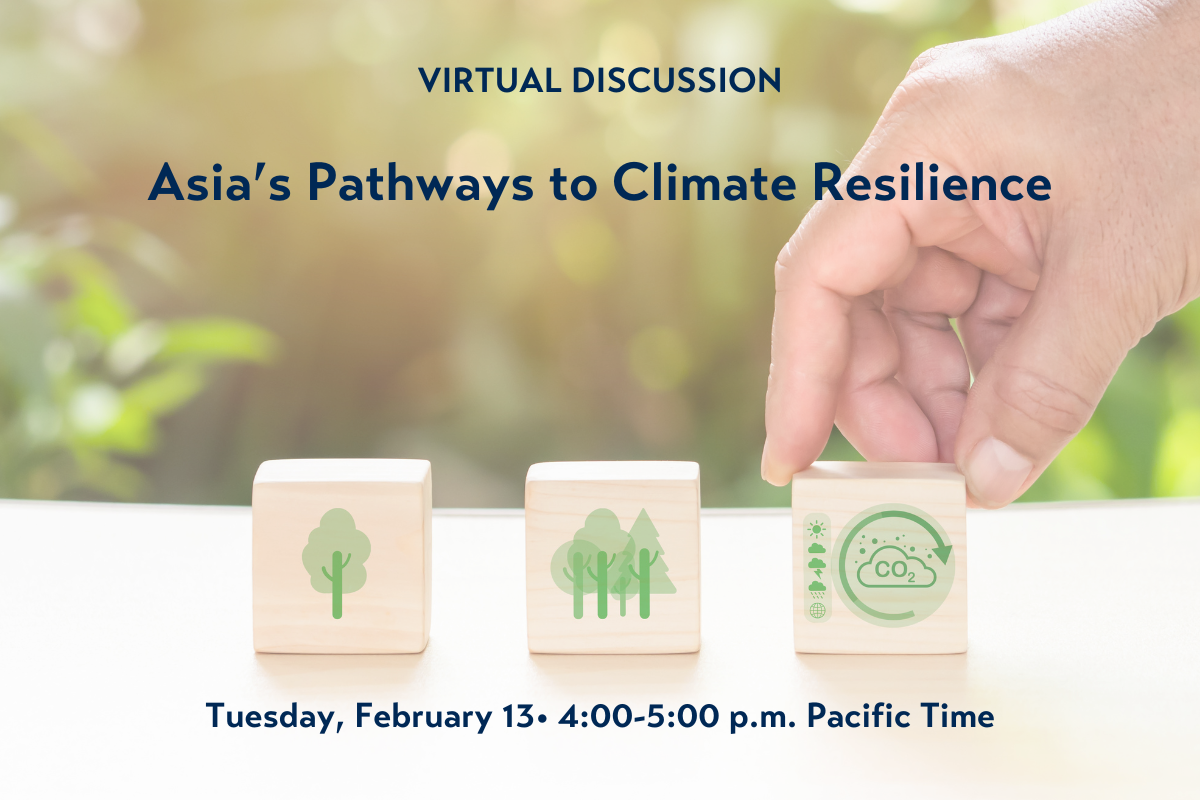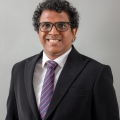Asia's Pathways to Climate Resilience
VIEW EVENT DETAILS
Asia is crucial to the global climate change efforts. The region is not only one of the most vulnerable to natural disasters and global warming but is also the biggest contributor to climate risks. Asia is responsible for approximately half of the world’s CO2 emissions and is home to five of the largest greenhouse gas-emitting countries – China, India, Japan, South Korea, and Indonesia. Asian countries are intensifying their efforts to address the impacts of a changing climate. However, mitigation efforts have been insufficient due to the region’s diverse economic structures and varying exposure to climate change.
How can Asia position itself and play a crucial role in global efforts to combat climate change? What are the region’s top priorities and challenges? What opportunities exist for multilateral collaboration among Asian nations? Join us online on Tuesday, February 13 for an in-depth discussion with seasoned climate experts Shuo Li, Director of China Climate Hub at the Asia Society Policy Institute (ASPI), Jackson Ewing, Director of Energy and Climate Policy at the Nicholas Institute of Energy, Environment & Sustainability at Duke University, and Kithmina Hewage, Senior Advisor at the Centre for Asian Philanthropy and Society (CAPS)
This is a virtual, on-the-record event. Free for Asia Society Seattle and Asia Society Northern California members. Registration and confirmation of registration is required. The Zoom link will be emailed to registered attendees in advance of the event.
AGENDA
Date: Tuesday, February 13, 2024 from 4:00 p.m. – 5:00 p.m Pacific.
4:00 p.m. Program Begins
5:00 p.m. Program Concludes
The Zoom link will be emailed to registered attendees in advance of the event.
SPEAKERS

Shuo Li is the Director of China Climate Hub at the Asia Society Policy Institute (ASPI). His work focuses on analyzing China’s environmental and energy policies and supporting the international community’s engagement with China’s climate agenda. Prior to ASPI, Li Shuo has more than a decade of experience in United Nations environmental negotiations, including on climate change, biodiversity, ocean, plastic pollution, and ozone.

Jackson Ewing is director of energy and climate policy at the Nicholas Institute of Energy, Environment & Sustainability at Duke University. He is also an adjunct associate professor at the Nicholas School of the Environment and a faculty affiliate with the Duke Center for International Development at the Sanford School of Public Policy.
Dr. Ewing’s current work focuses on international climate finance and just energy transition partnerships, meeting net-zero energy transition goals in the US, US-China relations, and Chinese outbound energy, industrial, and transportation infrastructure investments. He also leads educational exchanges between Asia and the United States through a leadership role with Duke Kunshan University in greater Shanghai. Dr. Ewing has worked in more than twenty countries, and collaborates closely with actors in government, the private sector, civil society, and international organizations. He publishes widely through a range of mediums and contribute to radio, television and print media.
Prior to joining Duke, Dr. Ewing was director of Asian Sustainability at the Asia Society Policy Institute under the leadership of the Hon. Kevin Rudd, where he led projects on Asian carbon market cooperation and sustainable resource development in the ASEAN Economic Community. He also previously served as a MacArthur Fellow and head of the Environment, Climate Change and Food Security Program at Singapore’s S. Rajaratnam School of International Studies. Dr. Ewing holds a doctorate in environmental security and master’s degree in international relations from Australia’s Bond University, and a bachelor’s degree in political science from the College of Charleston.

Kithmina Hewage is Senior Advisor at the Centre for Asian Philanthropy and Society (CAPS), where he leads the organization’s policy engagement and strategic outreach efforts with governments, philanthropists, corporates, and non-profit organizations across 18 Asian economies to improve the quality and quantity of private social investments in Asia. Kithmina is also a member of the Expert Network of the World Economic Forum (WEF).
Prior to joining CAPS, Kithmina has over 10 years of academic and professional experience in international development policy research, analysis, and consulting. This includes in the United States, United Kingdom, Switzerland, and Sri Lanka. During his tenure at the British High Commission in Colombo from 2020 to 2022, Kithmina worked closely with senior political, business, and civil society figures both in Sri Lanka and in the United Kingdom.
In the period 2015 to 2020, Kithmina worked for the Institute of Policy Studies of Sri Lanka (IPS), the country’s foremost policy think-tank. As a trusted advisor across the political spectrum in Sri Lanka, he was appointed to several government task forces on macroeconomic and investment policy reforms. Additionally, he has served as a consultant for international organizations such as the World Bank and the International Trade Centre (ITC).
As a regular guest on television and radio programs in several countries, Kithmina provides insight into global political and economic developments. He has been invited to speak on panel discussions and deliver keynote addresses at prestigious regional and global summits, including in Hong Kong, Singapore, and India. His op-eds have appeared in international publications such as Nikkei Asia and The Diplomat, while his research articles have been published by the United Nations Office for South-South Cooperation (UNOSSC) and Routledge.
Kithmina holds a BA with university and departmental honors from Johns Hopkins University and a MSc in International Public Policy from University College London (UCL).